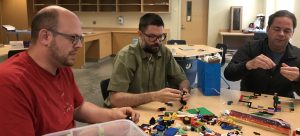Category Archives: Education Programs
PRAXIS CORE Review Sessions
Preparing for the PRAXIS Core exam? Check out these sessions that are run by experienced tutors and last one hour. They are free of charge!
Writing, 7-8pm, Ricker Addition 202
Tuesday, 9/18: “Multiple Choice”
Tuesday, 9/25: “Informative Essay”
Tuesday, 10/2: “Argument Essay”
Math, 7-8pm, Ricker Addition 205
Thursday, 9/20: “Functions and Algebra”
Thursday, 9/27: “Geometry”
Thursday, 10/4: “Stats and Probability”
An excellent additional resource for PRAXIS prep is the Learning Express Library. Students create a free account with Username and Password. They search the site for “PRAXIS CORE”, which produces four practice PRAXIS tests. The site scores the practice tests and provides explanatory answers.
Students preparing for the PRAXIS are also welcome to meet with tutors in the Learning Commons during drop-by tutoring hours:
Sunday-Thursday 6-8pm
Monday-Thursday 12-2pm
Ready, Set, the Academic Year is Here! We’re Ready, Here’s How You Can Be, Too!
Welcome back to UMF, beavers! We are so excited to have everyone back on campus as the academic year is kickstarting! As you begin this year, take time to reflect on yourself. What things you do well as a student? How can you improve as a student and a learner? Having a few months off from school is difficult, but we are here to give you advice on how to handle the transition like a champ, and to be ahead of the game!
1. Organization
Planning out your days is a huge life saver. Carrying and using a planner to help track your classes and accumulated coursework will make your time at the library more productive. Keeping track of your syllabus and highlighting due dates will keep you in the know. This way, when things come up you are able to handle the stress because you’re aware of your deadlines. Organization is one of the best ways to manage your stress. Click on some of the great apps that can help you stay on your game!



2. Stick to Your Plan
Having a daily plan is really important because everyone’s schedules can become so crazy that some days it feels difficult to catch a breath. That’s why creating a “to-do” list or having a handy app or planner will help you stay ahead of yourself. If you stick to your plan and study truthfully (no procrastinating), then you will have time for your social activities. Many students find that getting involved helps them plan out their days better, and they tend to procrastinate less.
3. Come to Class Prepared
Going to class prepared with all of the materials needed to succeed is a sign of excellence, and we want you all to succeed. Have you ordered your textbooks yet? ECAMPUS is UMF’s textbook ordering website, which is really convenient, since the books can be shipped right to the bookstore! Other suggested textbook ordering sites are www.chegg.com, www.amazon.com/textbooks, www.slugbooks.com and www.valorebooks.com. Completing your readings is a sign of your preparation for class. Readings are really important to the structure of many classes, as many class meetings are spent discussing the readings. At the end of the semester, the discussion participation often contributes to your final grade. So, plan when and how long your assigned reading will take you and stick to the plan. Make the reading assignments more enjoyable by finding new places to read and put forth your best effort! Going to class prepared also means showing up on time. Review your schedule and make sure you know where you need to be. Get there early and prepare yourself for the class.
4. Go to Office Hours
Office hours are very important because they allow you to engage with your professor/advisor in an unique way. Within the first few weeks of your courses, stop by and get to know your professors, because they want to get to know you just as much! If you are stuck on homework or understanding an assignment, go to office hours! Professors are usually really helpful and understanding and love when their students go the extra mile to better themselves and to understand what is expected of them. Office hours are posted on most syllabi, but if you are unsure, email your professors or walk by their office as most professors post hours on their doors.
an unique way. Within the first few weeks of your courses, stop by and get to know your professors, because they want to get to know you just as much! If you are stuck on homework or understanding an assignment, go to office hours! Professors are usually really helpful and understanding and love when their students go the extra mile to better themselves and to understand what is expected of them. Office hours are posted on most syllabi, but if you are unsure, email your professors or walk by their office as most professors post hours on their doors.
5. Use Down Time Wisely
After a summer of working and (hopefully) relaxing, it is difficult to jump back into the swing of things. If your class gets out early and you have an hour before your next class, try heading to the library. That is one less hour you have to work on your assignments later that night. Time is everything! Need a five minute facebook break? Don’t do it, that will end up to being a twenty, forty, or even sixty minute facebook break. Of course, Netflix is great, but create a balance between work and play and use your time wisely.
6. Sleep is NOT Overrated
In order to stay on top of your studies, sleep is one of the most important things. Getting a full eight hours of rest will help you be successful at UMF. Classes do get tough and time often gets tight, but getting your sleep is very important.. Naps are totally awesome, but you still need a good night’s rest!
7. Take Care of Yourself (Eat healthy, Stay Hydrated and Exercise)
At times, college can be overwhelming and stressful, but don’t let that get the best of you. Find ways to manage your stress though things that you enjoy and make healthy choices. Fill half your plate with non-starchy vegetables for a healthy meal. Try a fruit to satisfy that sweet tooth. 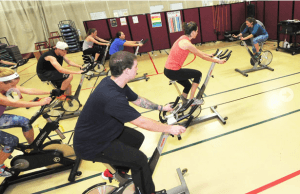 Getting up and moving is very important for your physical and mental health. The FRC has great workout classes and are opened until 11pm during the school year so you can squeeze a workout into your busy schedule. Even exercising for twenty minutes gets the blood flowing and can increase your academic performance! Bring a water bottle around with you. Staying hydrated helps you focus and stimulates your brain cells. All of our classroom buildings and resident halls have water fountains, so take advantage of it. It is really easy to catch various illnesses while living with others, being stressed, and not focusing on your health. So, remember to eat healthy, stay hydrated and exercise.
Getting up and moving is very important for your physical and mental health. The FRC has great workout classes and are opened until 11pm during the school year so you can squeeze a workout into your busy schedule. Even exercising for twenty minutes gets the blood flowing and can increase your academic performance! Bring a water bottle around with you. Staying hydrated helps you focus and stimulates your brain cells. All of our classroom buildings and resident halls have water fountains, so take advantage of it. It is really easy to catch various illnesses while living with others, being stressed, and not focusing on your health. So, remember to eat healthy, stay hydrated and exercise.
8. Use Your Resources
We have great tutors on campus who can help you with almost anything, so why not use your resources? They are truly the experts and are really helpful. If your class holds SI (Supplemental Instruction) Sessions from a former student who did outstanding in the class, GO! Not only is the SI Sessions helpful at expanding and understanding the content but the SI leader often tells the professor who attends and that shows you are taking an initiative.
9. The Library is a Great Place
Utilize the quiet places on campus to stay focused on your coursework and readings. Your friends are awesome but can be really distracting and want to talk your ear off while your test is the next morning. Mantor Library has many options, including private study rooms (in the basement and on the second floor), the mezzanine, the Learning Commons (first floor), Mantor Cafe, and the third floor which is often the quietest. The Learning Commons, private study rooms and Technology Center have spaces that are designed for group work as well.
10. Get Involved
Whether its with sports teams, club teams, on-campus clubs, or the intramural teams at the 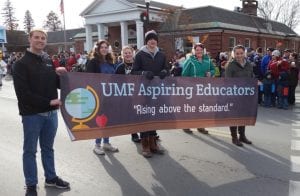 FRC, get involved in something you are passionate about. By getting yourself out there, you meet new people who often times turn into friends and great study partners. UMF has a ton of awesome clubs and activities. Towards the end of September, there will be a club fair where you can learn about and sign up to join club(s). Head to our Instagram page @UMF_CEHR to hear about all of our education clubs!
FRC, get involved in something you are passionate about. By getting yourself out there, you meet new people who often times turn into friends and great study partners. UMF has a ton of awesome clubs and activities. Towards the end of September, there will be a club fair where you can learn about and sign up to join club(s). Head to our Instagram page @UMF_CEHR to hear about all of our education clubs!
Most of all, have fun! There are many resources to help you. People on our campus have been known to be very friendly and welcoming whether you are a new, transferring or returning student. We look forward to seeing you around campus this year and good luck! Study hard, take breaks, and have fun!
PRAXIS Core Review Sessions
This semester, the Learning Commons will be holding multiple review sessions for education majors to prepare for the PRAXIS Core exam. The following sessions will be held from 7-8 PM in Ed Center 110:
Monday, 3/19: Multiple Choice
Monday, 3/26: Informative Essay
Monday, 4/2: Argument Essay
Tuesday, 3/20: Functions of Algebra
Tuesday, 4/3: Statistics and Probability
We hope to see you there!
Top Tips for Student Teachers
It can be nerve wracking or even intimidating to go into your Student Teaching placement. There are a lot of expectations that you need to follow, assignments to complete, and a lot to learn. When you begin your Student Teaching, it’s important to prepare what you can early on and to think about what else is expected of you. Below are some tips to help you transition into your Student Teaching placement:
Prepare for each week in advance- Don’t wait until Monday to prepare everything you need for the week. Plan your outfits, the time you’ll leave your house by, what you’ll bring for lunch and snack every day (which you will definitely need!). If you plan all of these in advance, you will be less frantic come Monday morning.
Research the school & area- Know what grades and what regions your school serves. Learn about the extracurricular activities offered at school and in the community. Find out what resources are available, and become more familiar with what your students do when they are not at school. Knowing where your students come from and what they have available to them will better help you plan your instructions and interactions.
Prepare for your lessons to fail- You cannot always predict how a lesson will go or how the students 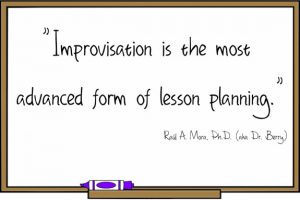 will react to the lesson. Sometimes, the lesson just does not work, and that is okay. But it is important to have a backup lesson or activity to supplement the lesson and to keep students on task and engaged during valuable classroom time.
will react to the lesson. Sometimes, the lesson just does not work, and that is okay. But it is important to have a backup lesson or activity to supplement the lesson and to keep students on task and engaged during valuable classroom time.
Know the expectations- Find out what is expected of you as a student teacher from both your mentor, your students, your placement school, and from your UMF Field Supervisor. Also, relay your expectations. Let your mentor know what you will need from them to be successful, outline your expectations about behavior and respect to your students, and express any concerns you have to either your mentor or your field supervisor.
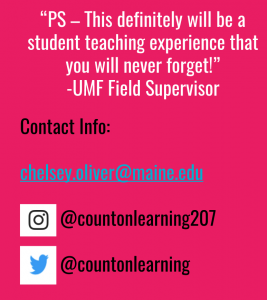 Make connections and learn from others- There are TONS of websites, Instagram pages, Twitter accounts, blogs, etc. that are for teachers, by teachers. You can find a variety of lesson plan ideas, classroom management tips, accommodations, tools, activities, and resources for teaching all ages. UMF alumna Chelsey Oliver took advantage of sites like these during her student teaching experience, and took it upon herself to create her own education inspired Twitter and Instagram pages- feel free to check them out!
Make connections and learn from others- There are TONS of websites, Instagram pages, Twitter accounts, blogs, etc. that are for teachers, by teachers. You can find a variety of lesson plan ideas, classroom management tips, accommodations, tools, activities, and resources for teaching all ages. UMF alumna Chelsey Oliver took advantage of sites like these during her student teaching experience, and took it upon herself to create her own education inspired Twitter and Instagram pages- feel free to check them out!
Stay organized and on top of your assignments- Start planning lessons ahead of time so that you can go back and make changes as the lesson approaches. Relay any deadlines that you need to meet to your mentor so that they can ensure you are getting what you need when you need it. Once you start to fall behind, it can be much harder to catch back up.
Take notes and ask questions- Your mentor teacher is there to model for you and to provide feedback. Take notes on the techniques and language they use, the way they manage their classroom, what you think works and does not work. Also take notes on student behavior, as you may notice patterns that can be valuable in addressing classroom management skills.
works and does not work. Also take notes on student behavior, as you may notice patterns that can be valuable in addressing classroom management skills.
Enjoy the experience- While Student Teaching is a lot of work, it should be an enjoyable and rewarding experience. Form relationships with students and have fun with them, take advantage of all of the opportunities presented, and make it unique to you! Take it all in and relish the experience, it goes by fast, and it will be over before you know it!
It won’t be easy, but it will definitely be worth it! You have spent the past few years preparing for this, learning from professors, and dipping your toe in the water in practicum placements. Now it’s time to dive in and immerse yourself into the classroom as an active Student Teacher. We know you will all shine and do great. From all of us here at UMF, good luck and have fun!
Christina Dionne: Striving to Make a Difference
Recently, one of UMF’s alumna was featured on the Mt. Blue Regional School District website for her exemplary work in building relationships with students and individualizing instruction. Christina Dionne, a graduate from UMF’s Secondary Education program, is currently teaching math at Mt. Blue Middle School and taking strides everyday to better herself as an educator and her students as learners.
Christina has always liked math, and she was in the advanced math classes in high school. When she first came to UMF she was an art major, but after her freshman year she changed her major so that she could pursue a career in math. The UMF methods courses that Christina took brought about a passion for teaching in her.
After graduating, Christina took a job as a camp counselor. Two years later, she became the arts and crafts specialist at camp. On her fourth year, Christina was promoted to being a unit leader and was responsible for managing the four groups within her unit, communicating with parents, and organizing activities and field trips. Eventually, Christina took on a job in early childhood, where she was able to understand child development more clearly and gain an understanding of how to better implement a curriculum with a holistic approach. Christina then took on her position at Mt. Blue Middle School.
Christina has expressed her commitment to proficiency-based education, which helped her to earn the respect of administration. Christina puts in very long hours at school, staying late to volunteer with After School Study and immerses herself in her work and her students.
One of Christina’s goals is to develop a proficiency-based program in math and show her students how to track their own progress in comparison with the standards. Christina would like to incorporate a more hands on approach that requires students to solve real-life math problems, and to implement the skills they learn both inside and outside of the classroom. She loves to challenge her students’ critical thinking.
Along with increasing student proficiency, Christina also makes it a point to create a student community in her classroom. Students often work together to learn from one another, build peer relationships, and increase their self esteem. This approach allows Christina to individualize instruction for those who need it while others are working together.
When asked about the challenges that she faces, Christina said that student frustration and behavior can be difficult. Christina tries to understand the cause of the behavior and work with the student to help them solve whatever problem they are facing. She aims to build healthy, valuable relationships with students. Christina also works at getting students interested in math. She uses various techniques, approaches, games, and activities to make learning math more fun and applicable.
Christina is one of many amazing teachers to have come from a UMF Teacher Education Program, and Mt. Blue Middle School and her students are lucky to have her! For more information about the amazing schools and opportunities in the Mt. Blue Regional School District, check out their website!
World Language Education: Preparing Language Educators for a Diverse World
The University of Maine at Farmington is excited to announce that it has created a new Bachelor of Science in World Language Education program to prepare educators for a career teaching Spanish or French in schools. There is an increasing shortage in the state of Maine and across the country of qualified World Language educators in the K-12 classrooms. This new major is designed to address the need for fully-certified World Language educators in the state of Maine and beyond.
A Maine Department of Education World Language specialist reports that all Maine high schools are now required to offer foreign language classes as a proficiency-based graduation requirement, and many Maine middle schools are expanding their language programs as well. Schools need language educators for a variety of reasons, including preparing students for a continuously evolving diverse world, collaborating with families from diverse backgrounds, and meeting college admission requirements.
This major will be offered beginning in the Fall of 2018. This program will provide an opportunity for students at UMF to become certified to teach in the classroom, with a deeper understanding of language and culture. UMF also teaches courses in Chinese and Japanese languages. For more information about the World Language Education major, visit the UMF media release or the UMF website.
Social Justice Picture Book Display
This semester, students from both sections of Professor Kathryn Will-Dubyak’s Reading & Language Arts K-3 class (EDU 333) created a Social Justice Picture Book display on the third floor of Mantor Library.

As part of a class project, the students were asked to recommend children’s books for the library’s collections, and they decided to focus on books relating to social justice. In order to make their recommendations; they considered reviews from professional sources such as Horn Book and Publishers Weekly, looked at nominations for children’s book awards, and assessed the quality of the text and illustrations.
The titles the students chose have been purchased by the library and are currently being processed into the Mantor Library or Spenciner Curriculum Materials Center collections.
Some of the chosen books are listed below with brief descriptions:

The Invisible Boy by Trudy Ludwig- Brian is a quiet boy who feels invisible. None of his classmates make an effort to play with him, invite him to their birthday parties, talk to him, or be his friend. When Brian befriends the new student, Justin, they become an unstoppable pair, and Brian shines among his classmates when he and Justin work on a class project together. This story shows how a small act of kindness and compassion can make a huge difference for children, especially the quiet ones.
 All My Stripes: A Story for Children with Autism by Shania Rudolph and Danielle Royer- Zane, a young zebra with autism, worries that he will have problems at school if the students only notice his “autism stripe.” Zane’s mother helps him to learn to appreciate all of his stripes and all of his qualities, and to learn that he is not defined by his autism stripes but by how he treats others with honesty, respect, and care. The book includes a Reading Guide with additional background information about autism spectrum disorders and a Note to Parents and Caregivers with tips for finding support.
All My Stripes: A Story for Children with Autism by Shania Rudolph and Danielle Royer- Zane, a young zebra with autism, worries that he will have problems at school if the students only notice his “autism stripe.” Zane’s mother helps him to learn to appreciate all of his stripes and all of his qualities, and to learn that he is not defined by his autism stripes but by how he treats others with honesty, respect, and care. The book includes a Reading Guide with additional background information about autism spectrum disorders and a Note to Parents and Caregivers with tips for finding support.

Sparkle Boy by Leslea Newman- Casey is a young boy who likes to play with puzzles, dump trucks, and blocks. He begins to show interest in his older sister Jessie’s things- her sparkly skirt, her shiny nails, and her bracelets. The rest of Casey’s family supports his interests, but Jessie doesn’t think that those things are for boys, so she doesn’t know how she feels about it. One day, Jessie sees other boys in the library picking on Casey for his “girl clothes.” Jessie realizes that Casey has a right to wear whatever he wants to wear and be whoever he wants to be. This is a great story that addresses and respects individuality and encourages freedom of typical gender roles and stereotypes.
For a complete list of stories included in the display case, click on the brochure below! The display can be seen in person on the third floor of Mantor Library. Great job to Professor Will-Dubyak and her class for such an amazing display and selection of books that are sure to touch your heart and make you feel good!
Sweatt-Winter Awarded New NAEYC Accreditation
“The Sweatt-Winter Child Care and Education Center on the UMF campus is proud to announce it has been awarded a new, five-year term of national accreditation by the National Association for Education of Young Children.
NAEYC Accreditation is a rigorous and transformative quality-improvement system that uses a set of 10 research-based standards to collaborate with early education programs to recognize and drive quality-improvement in high-quality early learning environments.
The Sweatt-Winter Center met 100 percent of the criteria in each of 10 program standards and was commended by the NAEYC for its outstanding efforts in maintaining and renewing its accreditation and for its dedication and commitment to continuous quality improvement. The center fully-met the required elements within the standard criteria and scored highly on the random elements. Less than 10% of early childhood centers nationally attain NAEYC accreditation.
“We are so proud of this national accreditation and what it says about the quality of our programs,” said Julie Farmer, director of the Sweatt-Winter Center. “High-quality early education and childcare have huge benefits for children, their families and the entire community.”
The Sweatt-Winter program has provided full-time care and education to children in Franklin County and the surrounding areas for more than 30 years. The curriculum is based on the interests of the children, and is carried out through the use of age appropriate activities. It offers a safe, nurturing and stimulating environment for children ages 3-8. A preschool program for ages 3-5 and a before-and-after school program for ages 5-8 are available.
The Sweatt-Winter program is located in University of Maine at Farmington’s Ricker Addition. In addition to its value as a top quality child care program, Sweatt-Winter also serves as lab school for UMF education majors where best teaching practices are taught and demonstrated by onsite UMF faculty instructors.
Hours of operation are from 7 a.m.–5:15 p.m. The program currently has openings in its before and after-school child care program. For more information please contact Julie Farmer, director of UMF’s children’s programs at 207-778-7480.”
Click here to view the complete article.
Makerspace: Creating Spaces to Innovate
Makerspace is an upcoming movement in the field of education. The goal of makerspace is to design a place for kids and students to create, play, and innovate. Johanna Prince, Director of Graduate Programs at UMF, has been involved in helping to educate the public about makerspace and potentially design a makerspace on campus. Johanna oversees the Masters in Technology program at UMF and has an interest in educational technology.
Makerspaces can be implemented and used in various ways. “I have seen makerspaces in kindergarten classes, art classrooms, high schools using high end, high-tech equipment,” said Johanna, “there’s a wide range in who can make use of them.” Makerspaces can consist of a fixed location to work in, mobile spaces in which items are transported to different locations on a cart, or even just a few shelves in a classroom with tools and resources designated for student innovation and creativity. Common tools and materials used are craft supplies, glue guns, small power tools, laser cutters, circuitry equipment, and much more!
3D printers are becoming increasingly popular as well, as people from various fields of study make use of them to design and create various tools. 3D printers can be used to create small or large items, math manipulatives, three-dimensional maps to study geography and landforms, and some assistive technology tools as well, such as a device to help turn a door handle or turn on a light switch. There is a 3D printer on campus at UMF, but it is not easily accessible to the public. If you are interested in making use of the 3D printer for educational and professional purposes, please contact Johanna Prince at johanna.prince@mane.edu
While there is not yet a dedicated Makerspace location on campus, there are various resources in the area that students and faculty can make use of. Everyone’s Resource Depot (located in the Education Center basement) has an abundance of craft materials and miscellaneous supplies at a very affordable price. The 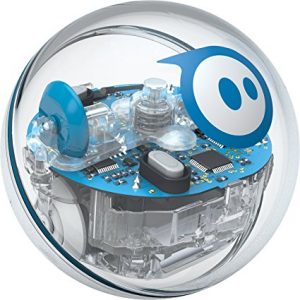 Spenciner Curriculum Materials Center (located on the first floor of the Education Center) has a variety of materials as well, including new Sphero Robots (pictured left), which can be controlled by tilting, tapping, or swiping your smartphone. Interested in learning more about Sphero Robots? Come to an interactive session using Sphero robotics and block based coding to play and learn, no prior knowledge or experience needed! This workshop will take place on Saturday, October 21st from 9:00-12:00 in Education Center 012. Spaces are limited to 20 participants, so fill out the registration form soon to ensure your spot!
Spenciner Curriculum Materials Center (located on the first floor of the Education Center) has a variety of materials as well, including new Sphero Robots (pictured left), which can be controlled by tilting, tapping, or swiping your smartphone. Interested in learning more about Sphero Robots? Come to an interactive session using Sphero robotics and block based coding to play and learn, no prior knowledge or experience needed! This workshop will take place on Saturday, October 21st from 9:00-12:00 in Education Center 012. Spaces are limited to 20 participants, so fill out the registration form soon to ensure your spot!
Are you interested in makerspace, and want to learn more about it what you can do with it? There will be two more makerspace workshops and discussions after the Sphero robotics coding one workshop:
Low Tech and High Tech Making: Saturday October 28th 9:00-12:00 in Education Center 012
Join us for a hands on session to explore high tech and low tech making. You’ll get a chance to play with 3D modeling software, use a 3D printer, and create using low-tech repurposed materials. Limited to 20 participants, so fill out the registration form before it’s too late!
What space is needed for a makerspace?: Wednesday December 6th 11:45-1:00 in Education Center 012
In this conversation we will continue to explore the ideal of making, creating and innovating. We’ll discuss the ways we already have these spaces in our community and places, as well as how we can leverage them to develop spaces and opportunities for more making.
At the last workshop, What is a makerspace?, there was an open conversation about makerspaces, what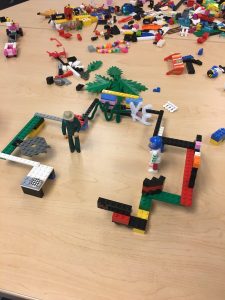 the goal of a makerspace is, and creativity! There was also a discussion about high school students who use high-tech materials in school coming to UMF, which has less tech integration and innovative technology faculty than their high school experience. It was an interesting and interactive discussion, and some small materials were provided to build and manipulate with. Check out these creations!
the goal of a makerspace is, and creativity! There was also a discussion about high school students who use high-tech materials in school coming to UMF, which has less tech integration and innovative technology faculty than their high school experience. It was an interesting and interactive discussion, and some small materials were provided to build and manipulate with. Check out these creations!
If you have any additional questions about makerspace, contact Johanna Prince (johanna.prince@maine.edu), Kathryn Will-Dubyak (kathryn.willdubyak@maine.edu), or Bryce Cundick (bryce.cundick@maine.edu). Stay up to date with the Ed360 blog to learn more about makerspace opportunities!








